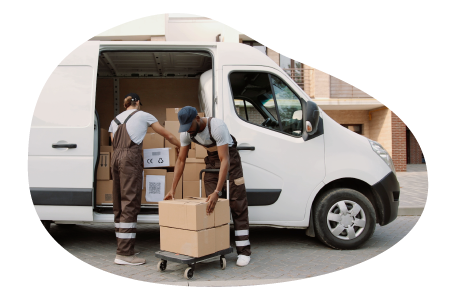
Non-trucking liability insurance
Non-trucking liability (NTL) insurance covers accidents that occur while driving trucks for non-work activities, like running personal errands or driving a truck home after a drop-off.
What is non-trucking liability (NTL) insurance?
Non-trucking liability insurance is a type of transportation insurance that covers a driver’s liabilities when driving a truck “off-duty” for personal reasons. It covers non-commercial activities, like driving to and from a truck stop, taking a truck home for the night, picking up lunch, or running an errand.
Most state laws require commercial auto insurance for trucking businesses that own or lease trucks. However, a commercial auto liability policy only covers trucks being used for business purposes, like transporting a payload. Because personal use is excluded, non-trucking liability insurance fills an important gap that a business auto insurance policy may not cover.
What does non-trucking liability insurance cover?
A non-trucking liability policy covers accidents that happen while driving a truck for personal use. If the driver causes a collision, non-trucking liability insurance covers their financial responsibilities and legal fees. Specifically, this type of insurance will cover:
- Third-party bodily injuries: If the accident injures another person, non-trucking liability coverage will cover their medical payments and rehabilitation costs.
- Third-party property damage: If the accident results in another person’s property damage or vehicle damage, non-trucking liability insurance will pay for the repairs.

What is the difference between non-trucking liability and physical damage coverage?
Non-trucking liability insurance coverage is just a liability policy. It covers a driver’s liabilities if they cause an accident that results in another person’s injuries or property damage.
A standard NTL insurance policy doesn’t cover physical damage to trucks after an accident. It also doesn’t cover damage from events like fires, hailstorms, vandalism, and theft. If you want physical damage insurance for your truck fleet, you can add it to your policy as an endorsement.
How much does non-trucking liability insurance cost?

Your non-trucking liability insurance rate will depend on a variety of factors, such as:
- Location
- Driver’s age and driving record
- Truck type and model
- Types of cargo hauled
- Number of trucks in the fleet
- Size of the operating area
You might be able to save money on NTL insurance by bundling multiple trucking policies into a fleet insurance package or paying your annual premium in full.
What our customers are saying
Who needs non-trucking liability insurance?
Non-trucking liability insurance is important for truck drivers who sometimes use trucks when they’re off the clock. Without it, drivers aren’t covered if they cause an accident during personal trips. Here are some examples of businesses that can benefit from NTL insurance:
- Trucking business owners
- Independent owners-operators
- Truckers that lease a trailer
What are non-trucking liability insurance restrictions?
Non-trucking liability insurance has some exclusions. It won’t provide coverage in the following situations:
- Driving a truck for work-related activities
- Bobtailing (driving a truck without a trailer)
- Driving a truck for another trucking company
What is the difference between non-trucking liability vs. bobtail insurance?
Bobtail insurance and non-trucking liability insurance are sometimes used interchangeably. However, they are separate policies that cover different scenarios. The main difference between bobtail coverage vs. non-trucking liability insurance is how the truck is being used.
Bobtail insurance covers a truck driver’s liabilities when they’re driving a truck on-duty without a trailer attached (commonly referred to as “bobtailing”). It’s meant to cover the period between a payload drop-off and the next pick-up.
NTL insurance covers drivers who are using a truck off-duty for non-business purposes, like running a personal errand, whether or not there’s a trailer attached.

Is non-trucking liability the same as unladen liability coverage?
Two other terms you might come across when shopping for commercial truck insurance are unladen liability and deadheading. Here’s how these differ from non-trucking liability insurance:
- Unladen liability: Unladen liability is any situation where a truck is driving, either on-duty or off-duty, without a payload. It can apply to a bobtailing truck (with no trailer) or a deadheading truck (with an empty trailer). Commercial auto insurance doesn’t cover unladen liability, but you can add this type of coverage as an endorsement to your policy.
- Deadheading: Deadheading is when a truck is being driven with an empty trailer. During this time, accidents are covered under deadhead insurance, which is separate from bobtail insurance and non-trucking liability insurance.
Commercial auto insurance doesn’t automatically cover unladen liability or deadheading, so you’ll likely need to add these as separate coverages to your insurance policy, if they are deemed necessary for your business.
Find non-trucking liability insurance quotes with Insureon
If you own or operate a business in the trucking industry, it’s easy to get the right types of insurance with Insureon. Fill out our easy online application to receive quotes from trusted providers for commercial auto insurance and other policies.
Our expert insurance agents are available to answer any questions about your coverage needs, policy limits, and more. Agents can also help you find other business insurance policies you might need, like general liability insurance or workers' compensation.
Once you find the right insurance solutions, most trucking businesses can get same-day coverage and easily download a certificate of insurance (COI) as proof of coverage.
